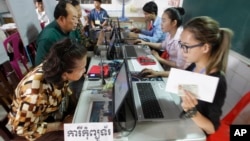Ruling party council candidates who lose the vote at the forthcoming local elections in June will receive a state salary as assistants to the winners.
The order was made in a letter on February 16 signed by Deputy Prime Minister Mem Sam An.
Hong Long, spokesman at the Ministry of National Assembly-Senate Relations and Inspection, said last week that the assistants would be entitled to a state salary.
Sok Eysan, a ruling Cambodian People’s Party spokesman, said the party “has to think about them and not let them go away.”
“[They can] do party work or those ministers or secretaries of state who can get advisers or assistants, they can get them so they can [receive a] salary to support their lives,” he added.
He added that the move was not a sign that the CPP was preparing for losses in the election.
San Chey, executive director of the League of Social Accountability Cambodia, said if it was state funds being spend on the positions, the rule should apply to all parties.
“If it is a government’s decision, I think it is beneficial for all unelected commune chiefs from all political parties, because it’s national policy. It’s not for a special or specific group. It covers all parties equally,” he said.
According to the National Election Committee, there were 1,633 communes in the 2013 commune election. Sixteen constituencies have since been added.







